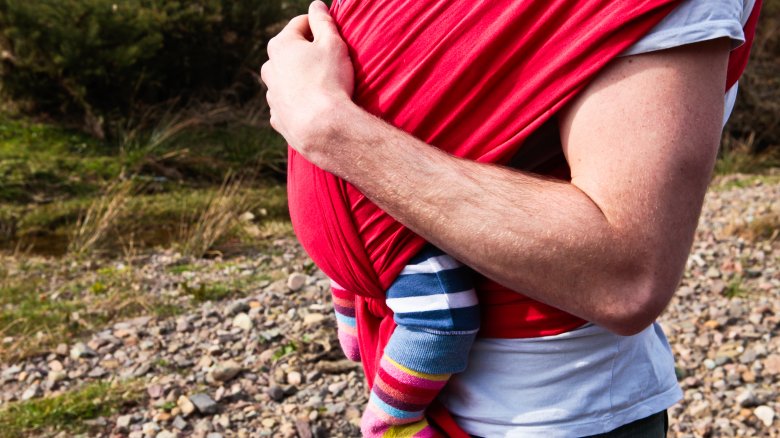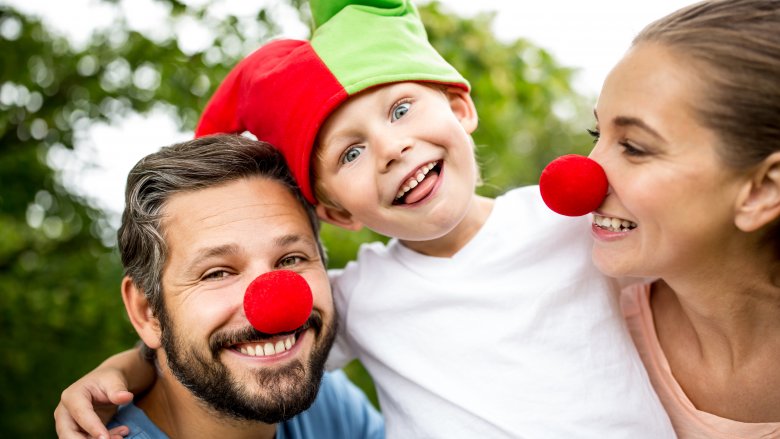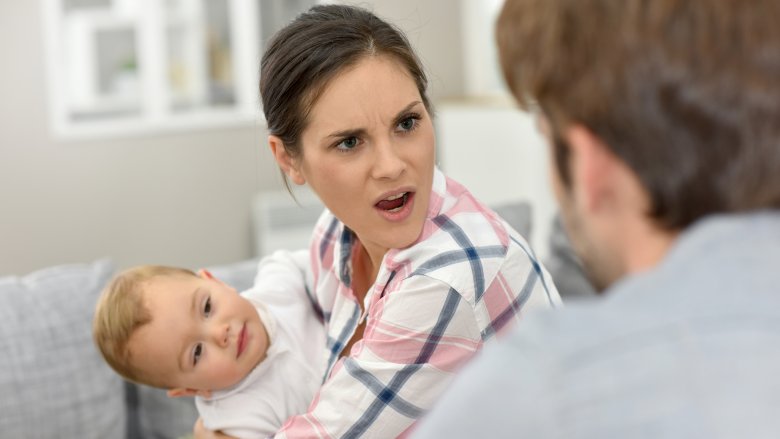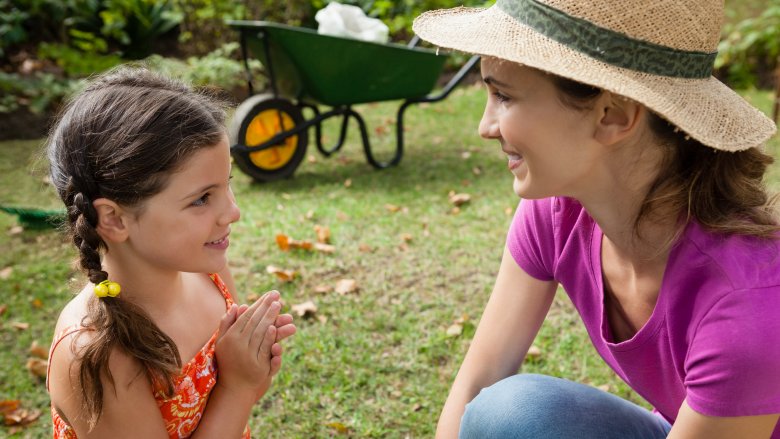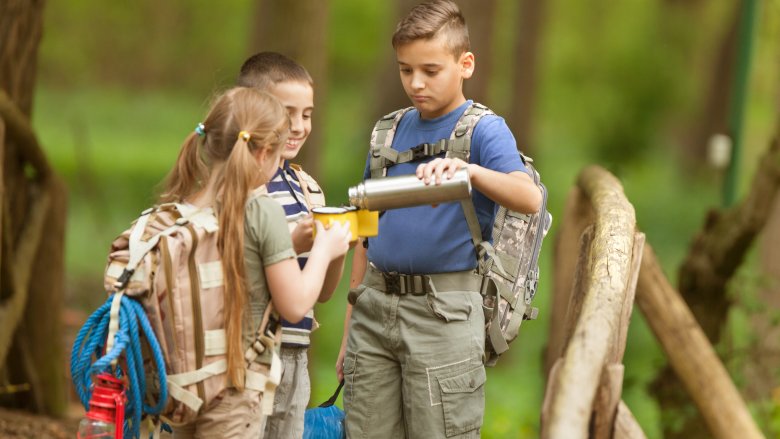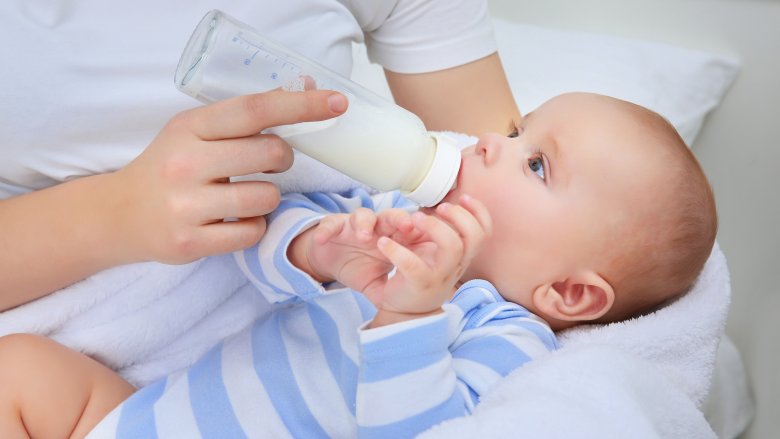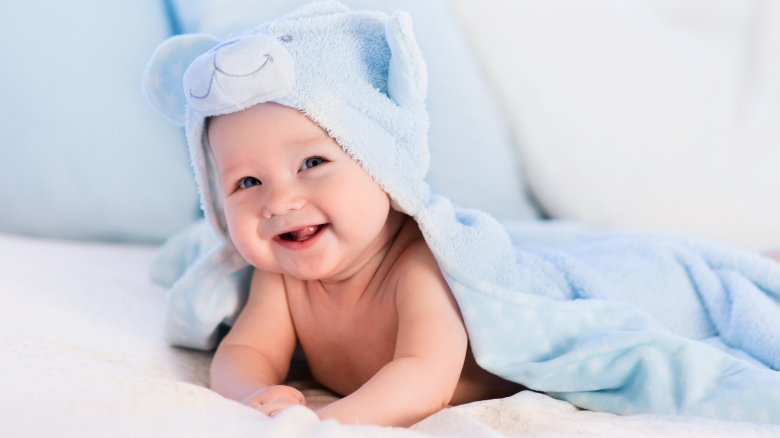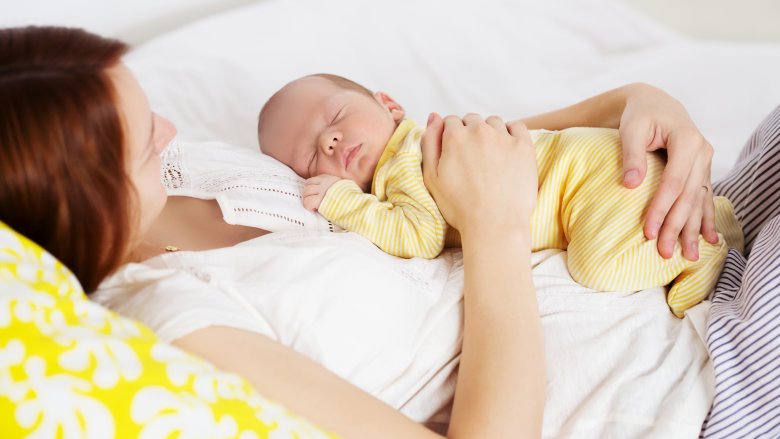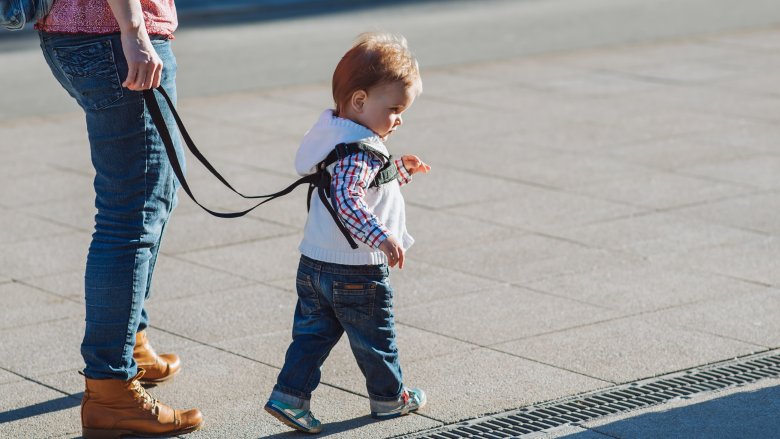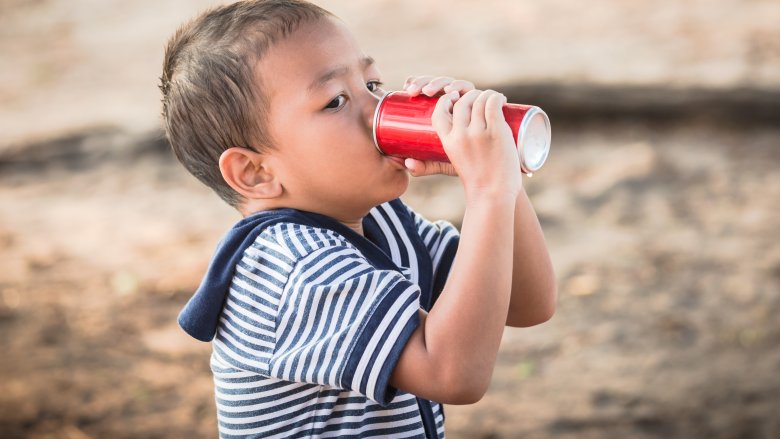Most Controversial Parenting Topics Every Parent Needs To Think About
Parenting isn't for the faint of heart. The moment I became a mother, I learned just how controversial every choice I made was. I remember being out at a basketball game with my barefoot six month-old. We were indoors, and she kept pulling her socks off, so I carried her around barefoot and was shocked at the number of people who walked up solely to scold me for this choice.
Controversial parenting issues go far beyond bare feet in winter. We parents now must decide what type of parenting style we will adopt, how to feed our babies, and if we are comfortable posting their pictures online. And don't even get me started on kid leashes. Here are just a few of the issues to think about before starting a family.
Attachment parenting
Just one of many controversial parenting topics is how to attend to your child's needs. Many of us remember that Time cover from March 2012. It featured Jamie Lynne Grummet breastfeeding her three year-old son, and the article detailed the problems with attachment parenting. Attachment parenting focuses on the child and centering care around his or her needs. Attachment parents are big on co-sleeping, feeding children on demand (as opposed to a schedule), and always responding to crying. "Attachment theory emphasizes the nature of the relationship between children and their caregivers (usually the parents)," Susan Krauss Whitbourne, Ph.D. wrote in Psychology Today.
Critics of attachment parenting worry that it keeps children from becoming independent, because they appear to always be "attached" to their parents. "Letting go is the primary objective of parenting and not doing so makes the parent-child relationship about you as opposed to them. As one of my mentors used to say, we teach children to walk and then to walk away; the latter is much harder to do," Clinical Director of Darien Wellness David Ezell told me.
Being friends with your child
We all want to be that approachable parent to whom our children can come with anything, but just how approachable to be is controversial. It can sometimes feel challenging to walk that line between being understanding and trying to be a child's friend. Our kids depend on us for limits, so trying too hard to be friends will not serve them.
"I see many parents make the mistake of imagining that being their child's friend will make them great parents; nothing could be further from the truth," explained Ezell. "Children need and crave structure. They will have plenty of friends but only one mom (or dad)."
While all parents will vary in their levels of discipline, it's important to remain the parent, even when it feels hard or wrong. "Parenting is frequently counterintuitive," Ezell shared. "Although it does not always feel good to enforce rules or solve your child's problem, in the long run it's best for everyone in the family."
When parents disagree on parenting styles
When you are expecting your first child, your focus is usually on choosing a doctor, managing your pregnancy symptoms, and designing the nursery. This is also the perfect time to check in with your partner about what kind of parents you want to be and make some parenting decisions. Most of us wait until the children are here and often feel shocked when we differ in parenting styles.
"Often, couples don't talk over details of how they will parent a child before getting married. After the birth, parenting styles surface and clash," President of Growing Leaders Tim Elmore told me. "Take the time (for the sake of your young) to talk over how you were raised, what worked and didn't work. Then, explore how to balance empathy with discipline."
Elmore explained that your specific parenting style does not matter as much as the two parents agreeing on the approach. "I believe it matters less how strict or lenient you are with your kids. What matters more is how consistent you are over the years," explained Elmore. "Kids can get used to strict rules (even if they don't like them) when caring adults remain steady and offer clear guidelines. This actually creates a secure environment. Even if your partner is unpredictable as they lead, you'll be seen as reliable."
Addressing sexual harassment
Today more than ever, parents need to think about how to address the controversial topic of sexual harassment with their children. As a mother to young children, I find myself falling into the trap of feeling that they shouldn't have to hear about these things yet, but it is already time to start having discussions.
According to Julia Simens, an expert on emotional resilience, when it comes to talking about sexual harassment, it's the earlier the better. "When elementary children learn the language and the emotions that come with sexual harassment, it seems that they will be more likely to voice these concerns as they get older," she told me. "It seems all elementary children know about bullying, so why not expand that concept to include sexual harassment as words to use to define this type of bullying."
You have probably talked with your young kids about stranger danger, but it is just as important to keep them safe around people they know. "Elementary age kids could benefit with a discussion of teasing, and what is not teasing, that includes how different words or actions can take one situation and make it okay while it takes another situation as unacceptable," explained Simens. "They also need to get away from the 'stranger danger' mentality and broaden it on relatives and peers of both genders. Often kids think sexual harassment can only come from the opposite gender."
Safe technology use
Because my one year-old already knows how to operate my iPhone (don't judge), it is never too early to start teaching your children about safe technology use. While technology use can be a controversial topic, you should decide early on how much screen time you are willing to allow and how to keep it safe. "From my perspective and research, the digital dilemma for parents is only at the initial stages of its accelerating growth," Media and Developmental Psychologist Rob Reiher told me. "It will become more and more problematic as the tools for communication combined with the embedded persuasive messages become more and more addictive."
Dr. Reiher recommended being very clear and concrete with your children about what is and is not okay when it comes to online websites and conversations. "Children between the ages of three to seven need definitive black and white descriptions of safe technology that is good for them and unsafe technology that is bad for them," explained Dr. Reiher. "Children in the eight to twelve year-old stage will not be able to understand the more subtle layers of 'bad' technology, but will be very persistent about their involvement, based on increasing social and media pressure. This is an opportunity to begin training the needed self reflective skills at the level of simple black (bad) or white (good) solutions."
For your teenagers, make sure to respect their feelings and need to stay engaged with their friends on social media, but still set clear boundaries.
Girls in Boy Scouts
I will admit that I never knew there was a controversy with girls in Boy Scouts. I had always assumed that girls joined Girl Scouts, but that all changed in 2017 when the Boy Scout Association (BSA) announced that girls were welcome to join and progress to Eagle Scouts.
"This decision is true to the BSA's mission and core values outlined in the Scout Oath and Law. The values of Scouting — trustworthy, loyal, helpful, kind, brave and reverent, for example — are important for both young men and women," Chief Scout Executive Michael Surbaugh said in a press release. "We believe it is critical to evolve how our programs meet the needs of families interested in positive and lifelong experiences for their children. We strive to bring what our organization does best — developing character and leadership for young people — to as many families and youth as possible as we help shape the next generation of leaders."
This decision did not sit well with everyone, and some believed the Boy Scouts were stepping on the Girl Scouts' toes. "I find it interesting that now it seems to be cast as a progressive move on the part of the Boy Scouts," Assistant Professor of Childhood Studies at Rutgers University Susan Miller told The Atlantic. "It's hard for me to believe it's a philosophical change. It's kind of an attempt at a hostile takeover."
Bottle versus breastfeeding
Choosing breast milk or formula has long been a controversial parenting topic. However, a recent study in Pediatrics may change that. According to researchers, breastfed children do not necessarily have an edge over bottle-fed babies.
While the study did find that breastfed babies scored higher in vocabulary and problem-solving as 5-year-olds, the authors believed those findings had more to do with other factors, such as the mother's education level. The one area where breastfeeding seemed to make a strong difference was in hyperactive behavior in three year-olds. However, even that finding was not true by the time children turned 5.
"The belief that babies who are breast-fed have advantages in their cognitive development, in particular, has been a topic of debate for over a century now," study author Lisa-Christine Girard told US News. When it comes to feeding your baby, always talk with your pediatrician about the best fit for you and your family.
Circumcision
Choosing whether or not to circumcise your son is a decision to start thinking about before the baby is here. The American Academy of Pediatrics (AAP) comes as close to recommending circumcision as one could without actually recommending it. "After a comprehensive review of the scientific evidence, the American Academy of Pediatrics found the health benefits of newborn male circumcision outweigh the risks, but the benefits are not great enough to recommend universal newborn circumcision," the group wrote in a report.
It is best to discuss the pros and cons with your partner and pediatrician when making the sometimes controversial decision. It is important to remember that while circumcision is an elective procedure, it does have health benefits for boys and men. "The surgery risks remain the same as when the last statement was written 12 years ago, but from the new research we have, it is clear that circumcision does provide protective health benefits, particularly with regard to HIV and HPV [the human papillomavirus]," AAP circumcision task force member Dr. Douglas Diekema told Parents.
Some parents choose to avoid the decision and leave it up to their child when he is older, but this could put him at risk. "Plus, if he waits to make the decision as an adult, he will have missed out on the protective benefits during any previously sexually active years," Diekema explained.
When to teach the birds and the bees
When do we really have to have "that talk?" Unfortunately for us squeamish parents, it is probably already time to start talking.
"Some parents want to put off teaching about sex as long as possible, maybe because they don't think little kids need to know about bodies and conception, or maybe because it's just so awkward. Other parents want to start conversations early so the topic doesn't become a big deal later," Licensed Marriage and Family Therapist Jill Whitney of Keep The Talk Going told me. "Taking the deep breath and answering questions makes you the go-to source for questions about sexuality. That's much better than letting them rely on peers, TV, and the often-inappropriate internet for the information they want."
You don't have to have an entire seminar planned, but be prepared to give short answers to specific questions. "Based on my work as a therapist and research I've done with young adults, I'm firmly in the 'start early' camp," explained Whitney. "When kids are curious about the world, including things like 'how did the baby get in there?', tell them. Use simple, accurate language so kids know proper terms and don't think there's something shameful about bodies. Figure out what, exactly, your child is asking and keep answers targeted and short."
Co-sleeping
Co-sleeping is a controversial but important issue to think about before your child arrives, because it is literally a life or death situation. Sure, it may be hard to decide if you want your daughter joining Boy Scouts or Girl Scouts, but either way she will be fine. However, when it comes to co-sleeping, making the wrong choice could lead to sudden infant death syndrome (SIDS).
"Infants should sleep in the same bedroom as their parents — but on a separate surface, such as a crib or bassinet, and never on a couch, armchair or soft surface — to decrease the risks of sleep-related deaths," recommends the American Academy of Pediatrics.
In the United States alone, about 3,500 babies die each year from sleep-related deaths. "Putting the baby's crib or bassinet in your room means your baby is right there with you — steps away," Family Practitioner Rallie McCalister told The Bump. "But she's in her crib, which is the safest place for a baby to sleep. Your baby's crib should be her safe haven. This is what's best — for her and for you — and what will help you both get the most sleep!"
Sharing photos online
Are you a "sharenter?" That is the new term for parents who choose to share their children's photos online. While it only takes a moment to share a picture on Facebook or Instagram, it takes much longer to consider the benefits and risks of the controversial parenting practice.
"Sharing the highs and lows of parenthood can create camaraderie and support," Pediatrician Kate Land wrote for US News. "But before we enter into the social media space, we need to consider whether we are potentially compromising our children's safety, embarrassing them, or violating their privacy with online postings that will linger for years to come."
Land recommends always asking for permission from your child before posting any picture. "By asking for input and permission, parents are not only showing respect for their children and their sense of identity and privacy, they are also modeling good digital behavior," she explained. "We are showing our children that it's not OK to talk about others online or post pictures of them without asking for permission first."
Kid leashes
We have arrived at the controversial child leash. Psychologist Jennifer Hartstein told TODAY that some children who are more likely to run away without thinking may do well with a child leash. "Some parents really do not know what to do, so this is a potentially effective solution," she explained.
However, other experts just can't get beyond the fact that parents are actually putting leashes on their children. "To me, it's like treating a child like a dog or an animal when in fact as a parent your job is to make the rules," Psychologist Susan Newman told TODAY. "The perception is, this is a parent who can't control her toddler."
At the end of the day, we are all parents who are just doing our best. Even if you are against leashes, does not mean that they are wrong for everyone. "Parents are often judging one another rather than supporting one another," said Hartstein. "It would be so great if parents could use the situation as a discussion point rather than a divisive one."
Common core standards
There is one phrase that sends chills down the backs of parents of school age children, and that phrase is "common core." The common core standards are a set of standardized standards for math and English. "These learning goals outline what a student should know and be able to do at the end of each grade," the website explains. "The standards were created to ensure that all students graduate from high school with the skills and knowledge necessary to succeed in college, career, and life, regardless of where they live." Many schools have adopted these standards, and educators' opinions are mixed.
The main concern is that the standards encourage testing young children before it is appropriate. "The real school starting age is 7," Dr. Alvin Rosenfeld told Forbes. "It may be 8 or 6, depending on the child. This is all based on what we know about child development, starting from Piaget. Your brain isn't sufficiently wired to do it before then. And you also have to keep in mind, all kids are different, and it's very hard to predict what will happen with age. Some kids who were reading Harry Potter at 4 end up as career baristas. Others can't read till they're much older, and they turn out to be highly successful as adults."
Before choosing a school, look into their teaching philosophy and how the teachers feel about the methods.
Giving kids soda
I'll be honest, when I see a toddler taking a swig of soda, I roll my eyes. I can't imagine a situation when it would be a good idea to introduce soda to a child. However, there are many parents on the other side of this controversial parenting issue, so it's important to decide on your stance before your kids start asking. A study in The Lancet found a significant correlation between drinking sweetened beverages like soda and the risk of childhood obesity, but not all researchers believe this issue is black and white.
There are many factors contributing to childhood obesity, not simply soda. "The cold hard reality is that people are eating too much and exercising too little," Dr. Maureen Storey told ABC News. "Portion sizes have expanded dramatically and it is simply wrong to blame increases in obesity on food or beverages that contain carbohydrates."
At the end of the day, it's up to you as a parent to decide what foods and beverages are right for your children.
